#character guide
Text

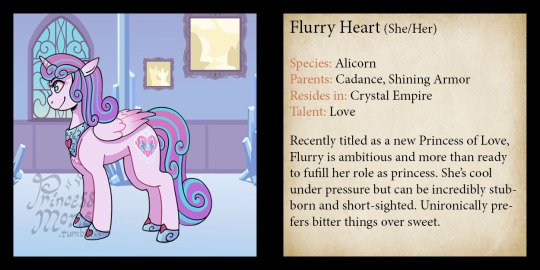
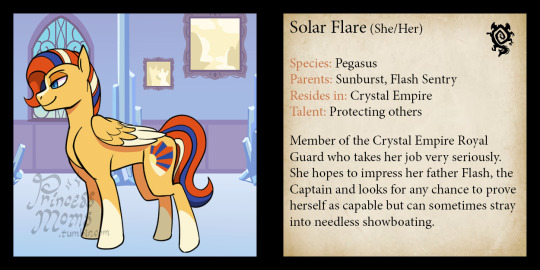
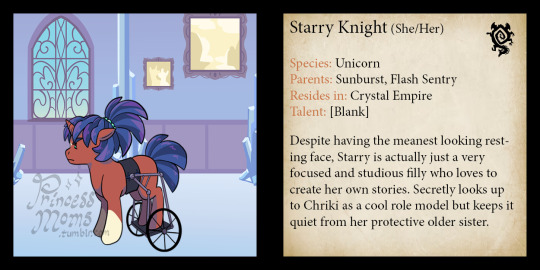
Character Guides (pt. 3) - Crystal Empire
Heres the last of the character guides for now, the Crystal Empire doesn't have too many OCs living there. New characters may get added or will get posted separately.
There might be some for the Mane 6 and Student 6 next to show where all those characters are at in the future.
#mlp next gen#mlp ask blog#mlp fim#princess flurry heart#chriki#solar flare#starry knight#yes i cheated with the fluriki ones by reusing their reference sheet art#character guide
44 notes
·
View notes
Text
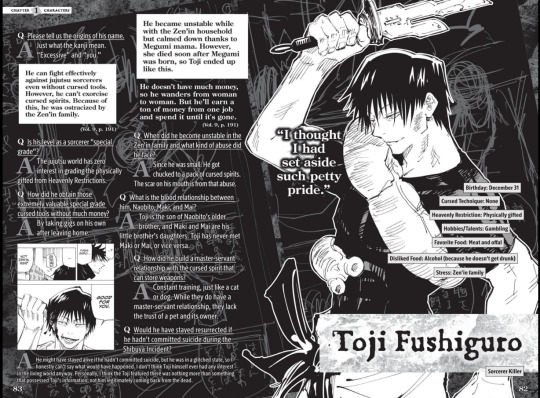
my jjk character guide book finally arrived on kindle and I like toji , he is a cool character
32 notes
·
View notes
Text
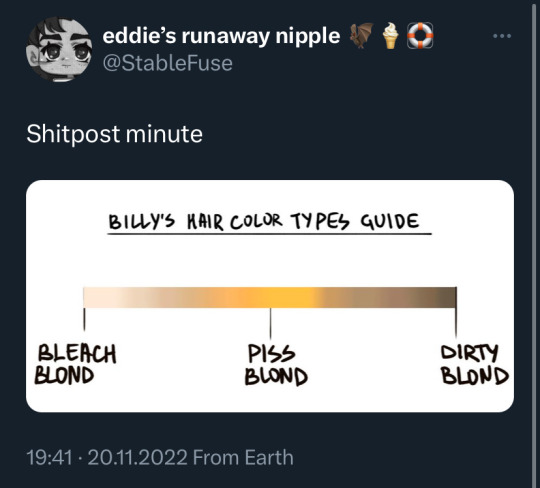
the most accurate, bestest, top tier character guide ever, billy hargrove edition!!
golden mean is the peak tho 🫵🫵🫵
191 notes
·
View notes
Text
Characters Bios for The Boys in the Boat
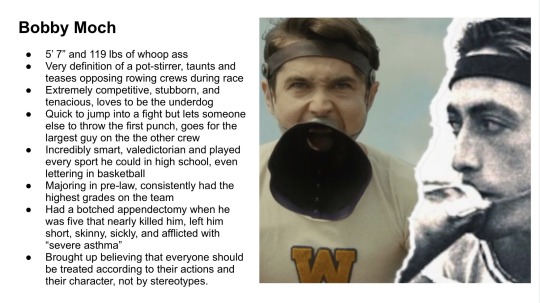
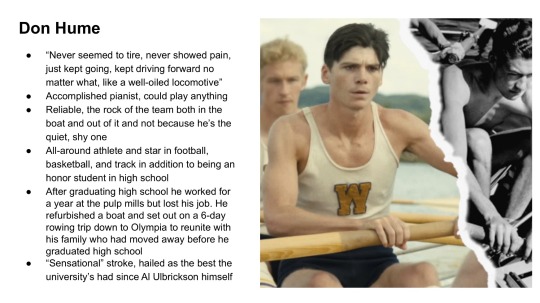
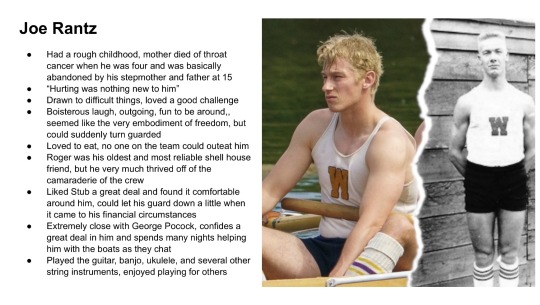
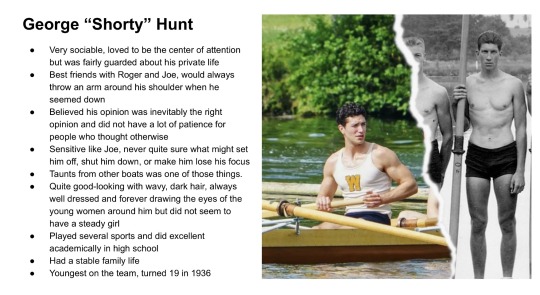
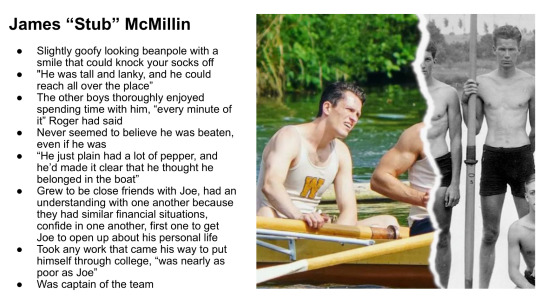




#PLEASE LET ME KNOW IF I GOT ANYTHING WRONG#I WILL GLADLY FIX IT#source was almost entirely the book by Daniel James Brown#bobby moch#the boys in the boat#boys in the boat#character bios#fanfiction references#fic resources#information#references#research#character guide#Don Hume#Johnny white#Joe Rantz#chuck day#roger morris#george shorty hunt#george hunt#Gordy Adam#James stub McMillan
133 notes
·
View notes
Note
Rq who is nika? Had some art tagged daminika cross my dash and I am Intrigued
Nika alias Flatline, a character created by writer Joshua Williamson and artist Gleb Melnikov, was introduced in Robin(2021) run—where Damian Wayne as the fifth Robin running off home attended the Death tournament on Lazarus Island.
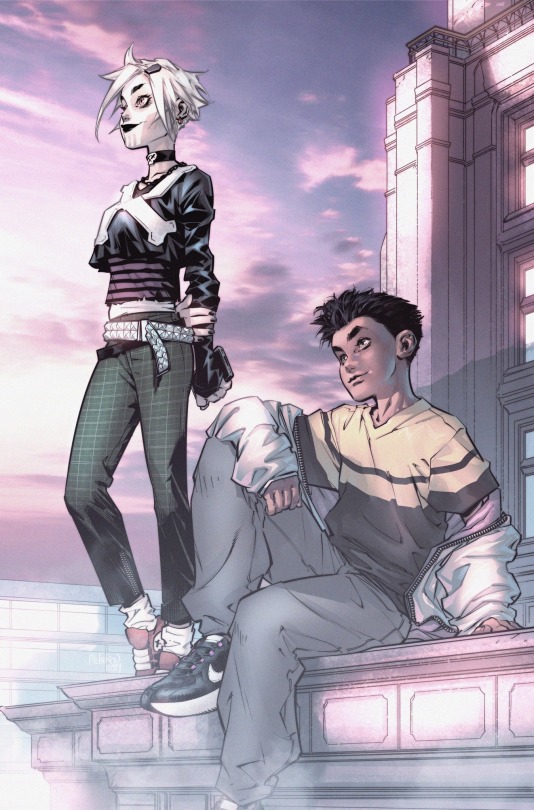
Nika is the first opponent Damian faces on the island and she proceeds to take his first life with her signature move— ripping his heart out with her bare hand (no one actually dies, people would have three lives during the tournament on the island).

She is a Russian metahuman girl and a martial arts fighter, with the power to absorb the skills of people who had died in her hands.

Flatline(+Damian) arts from Gleb Melnikov's Twitter(X)
Here's the reading guide/list of her! Made by @/ redhoodtwt on Twitter(X)
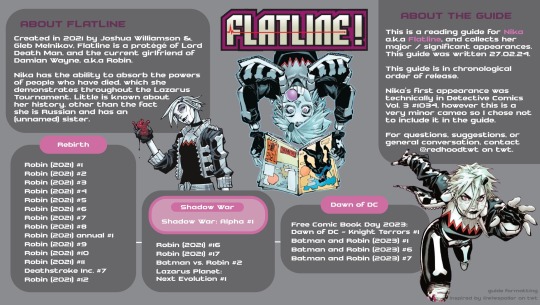
Reading order↓ (text ver.)— Mainly appears in Robin(2021), Lazarus planet: Next evolution, and Batman and Robin(2023), with some mentions and cameos in other/different issues
Rebirth- Robin(2021)#1-8, Robin(2021)Annual#1, Robin(2021)#9~11, Deathstroke Ink.#7, Robin(2021)#12
Shadow War- Shadow War: Alpha #1, Robin(2021)#16~17, Batman vs. Robin#2, Lazarus planet: Next evolution#1
Dawn of Dc- Free comic book day 2023: Dawn of dc- Knight Terrors#1, Batman and Robin(2023)#1, Batman and Robin(2023)#6~7…(current ongoing run)
Another Flatline summary and reading list made by @/ batquinz on Twitter(X)
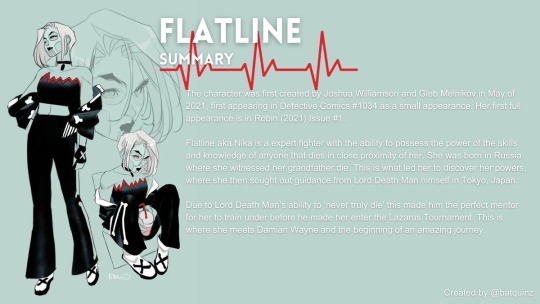
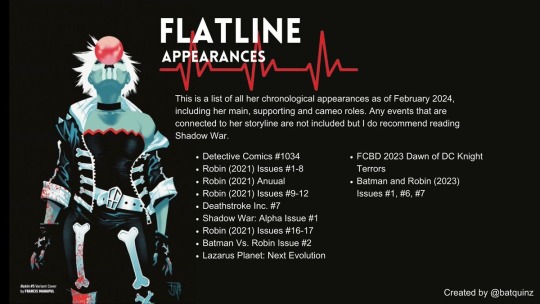
And here's a quick rundown of Nika and Damian's relationship thread on Twitter(X) Made by @/ nightwingstyles

Some daminika covers that I love! (they have a lot of ship names, and the most popular ones are: daminika, flamian, gravebird🪦🕊️, graverobin🪦🐦, birdskull🐦💀)
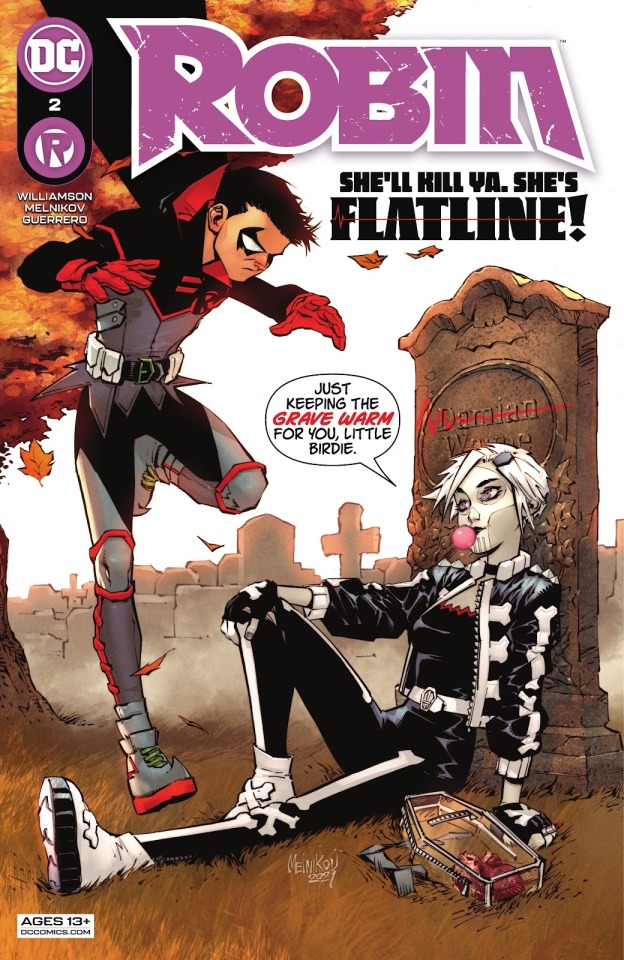
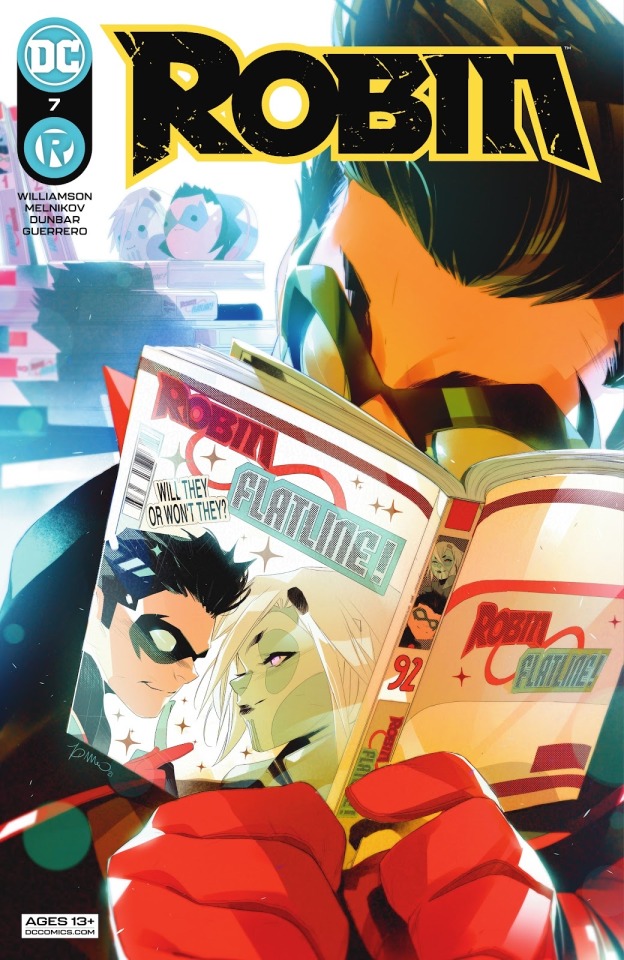
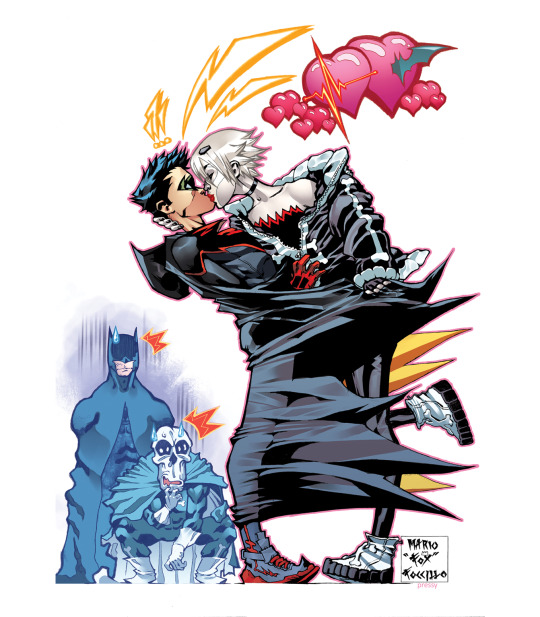
Cover art- Robin(2021)#2/ #7/ #15(1:25 variant cover)- Artist: Gleb Melnikov/ Simone Di Meo/ Mario Foccillo
And currently, Nika is in the new issue of Batman and Robin(2023)# 7!
Thank you for reading and taking an interest in Nika!! Hope you will like her as an amazing cool character!!!💀♥️
#nika#flatline#damian wayne#robin 2021#batman and robin 2023#nika dc#flatline dc#damian al ghul#daminika#flamian#gravebird#graverobin#birdskull#character guide#flatline guide#nika guide#flatline reading guide#nika reading guide#comic reading list#dc comics
73 notes
·
View notes
Note
Why is Rachel considered a masculin charecter?
Rachel's "masculine" character
That seems to be a common misunderstanding within the fandom, which I also fell victim to for a while. I think it stems from the English fan translation (perhaps even the French licensed translation?) about her in the Character Guide.
Yana-san tried to clear that up a while later, like in tweets or something, but it's still a pervasive misconception.
What Yana-san was trying to say is that Rachel is a strong-willed woman, much like Vincent says of the Phantomhive women. In "With Father" he was mostly talking about his sister and mother, but he probably chose to marry a woman who shares many of the same characteristics.
Rachel doesn't have the strongest physical health, given her severe asthma, but she's clearly (per the Character Guide and Vincent) the disciplinarian in the family, not Vincent. And we've seen her take charge of a situation when Vincent didn't know what to do or say (when real Ciel says he doesn't want to become earl anymore). She's also canonically the one who names the boys, since Vincent says so, explaining to the real Vicar Rathbone that he's no good with choosing names and that Rachel named their own sons.
She's also got a rather raunchy sense of humor (grabbing her little sister's boobs and being openly envious of her for her endowments). Madam Red might have developed her own naughty sense of humor partly influenced by Rachel's.
Idk exactly how the original Japanese words it in the Character Guide, but at least one translation came up with "masculine" to describe her personality. Like I said above, the fandom -- including me -- ran with it. I haven't deleted the old posts I made about it, but there should be reblogs or comments or both on some of the old posts, where I try to clear up the confusion. And there should be some newer posts, like this one, where I explain the misunderstanding.
Rachel's strong-willed and not particularly demure, with her occasionally raunchy and scathing wit. She takes charge of situations when her husband isn't sure what to do. She's the one who spanks the children when they misbehave, and so they fear her more than their father. Some would call this "masculine" of her... and that's possibly how the misunderstanding came about in the first place. She doesn't 100% fit gender norms of the Victorian era. But then again, who truly did?
Personally, I find characters who fit 100% to some stereotype to be one-sided and boring. Rachel strikes me as an interesting, multifaceted character. And we still hardly even know her....
#black butler#kuroshitsuji#rachel phantomhive#personality#clarification#anon asks#i answer#answered asks#aug 27 2023#with father#character guide#vincent phantomhive#madam red#angelina dalles#angelina durless#francis midford#frances midford#claudia phantomhive#cloudia phantomhive
90 notes
·
View notes
Text
counseling 101: the background.
hi everybody! my name is riley, and i'm a substance use counselor. i've worked in both inpatient and outpatient, i've been in this field since i was 19 and have been professionally working for 2 years. i'm currently in grad school for clinical social work, pursuing my lsw and my clinical licensure (lcsw). i wanted to write a guide on what it "means" to be a counselor! i will be discussing the specifics of a substance use counselor in another post. (it will be linked below.)
disclaimer:
do not take this as professional advice for all counselors, therapists, psychologists, or social workers. this is my background, my information, my experiences, and my specific expertise. this will include the basics of schooling, training, certifications, frequently asked questions, and things you might not realize, as it all pertains to me! what works for my patients and i may not work for you, so be mindful this is not a "my way is correct and your therapist is wrong," as i believe in the pct model of meeting everybody where they're at.
even counselors at my exact experience level and education level may do things differently than me, and that's perfectly fine! i just wanted to write this to give some insight if you're interested in writing a character who is a therapist, or who goes to therapy. or if you're just interested in general! i could give reminders upon reminders but i just need to say that this is all my thoughts and path in life! this is not the end all, be all. and with that, let's get started. (if you have further questions or need something clarified, please feel free to reach out but just for clarification: i'm not your therapist, i'm not being paid for this, please don't trauma dump, and always remember i'm a human just like you!)
education:
your education is based a lot on your "experience" (which i'll talk about next) and i know that doesn't make sense but just stick with me! the very basics of what you need is a bachelor's in a "social work" setting. which includes, but is not limited to (because i forget): psychology, social work, sociology, criminology. these are the foundations for your specific field of work! i'll just be talking about counseling in general, or about substance use, as i am unaware of the other jobs / fields you can get with different degrees.
if you're trying to get a "good" job (livable wage) i would suggest getting a master's degree in your field of work. though, i will say, you can get lucky and survive off of your bachelor's (like i currently am!) but i would strongly, strongly encourage further education which will lead into certifications and licensure, and that will cement your place in the field and open up the job field entirely. with a bachelor's, they often want anywhere from 1-5 years of experience. with a master's, many places will take you with 0 years of experience, up to 5 years, depending on your field and what the company wants.
i currently have my bachelor's in psychology. psychology is such a broad degree that unless you're specifically going to be a clinical psychologist or gain your doctorate, i would choose another field. i didn't know i wanted substance use specifically until i was 19, which i'll speak about in experience, but if i did not choose the substance use field, i would most definitely would have had to immediately get a master's and be licensed in order to receive well paying jobs with just a psychology degree.
experience:
you don't need a master's to get a job in this field, but you do need experience (there will be places that take bachelor's with little to no experience, but will pay you next to nothing). the best thing to do is find an internship! i think the easiest way will be through your school, and when you're picking one of the aforementioned degrees, it should be an option when picking out classes - many times, universities have people that specifically work with internships.
when i was getting my bachelor's degree, it was my first semester and i was 19 when i was offered to interview for an internship through my school. i got accepted on the spot and was apart of it even after i got my "credit" for the semester and continued for two years! i worked in houseless shelters in my county and was running daily men and women's groups, 2:1 sessions (2 counselors to 1 resident), debrief sessions with the other interns, and supplying a resource booth for the residents.
without this internship, i truly and wholeheartedly believe i would not have gotten any job in this field. it's a dog-eat-dog out there in the realm of psychology (which includes all those fields above) and i truly got lucky to get my start this way. if you don't have the time, motivation, or money to gain a master's, i would highly suggest getting involved in internships as soon as possible in order to get those years of experience!
certifications:
this has a wide range of things! i can only speak to what i've received, and what i know about. this also includes specific training to the sud field, but i won't go in depth about it until the next post i do! the certification i will always need is my cpr. i know that sounds silly, but working with people, in general, i feel like everybody that is able to should receive their cpr certificate!
now, with a bachelor's, they're not really expecting you to have anything else. but! you can. i currently have my milieu certification. which sounds fancy but it just means i'm certified in "psychotherapy in which the patient's social environment is controlled or manipulated with a view to preventing self-destructive behavior." i could've explained it myself, but google does wonders and makes me sound smart! i got this through my internship. it was required and within the first two weeks, i went through trainings and seminars to receive the certificate.
another thing i can receive with only a bachelor's (that's specific to sud) is my cadc certification. it stands for certified alcohol drug counselor. in order to do this, you'll need supervision hours from a clinical / licensed or otherwise appropriate supervisor or director. once i receive upwards of 300 hours of documented supervision, i can take my cadc exam and become certified. this can also enhance what jobs are available to me because many jobs ask for this certification in place of a clinical license (some don't, but you know... some do!)
currently, i'm working on my master's and may potentially work towards my cadc along the way, but once i receive my master's i can get my caadc, which is certified advanced alcohol drug counselor. it's just more hours and an exam! not sure which path i'll take yet because grad school is killing me, but those are what's offered in my field and what i'm interested in! of course there's other certifications involved, but that's for you to decide.
licenses:
now comes the fun part. again, what license you want or go for is specific to your field. there's a ton of counseling licenses, but the main ones that are down my path are lpc (licensed professional counselor), lsw (licensed social worker), and lcsw (licensed clinical social worker). so let me explain a little bit about each of them, and what i'm personally doing!
lpc: licensed professional counselors "are trained to offer assessment, therapeutic interventions, consultation, program evaluation and follow-up services in a variety of settings including schools, hospitals, community agencies, private practices, religious centers, group homes and more. lpc's can also independently practice counseling, meaning they can establish or join a private practice and directly bill insurance companies or receive cash for counseling services." can: work independently, diagnose mental health conditions, and supervise for clinical hours. this license is primarily for direct mental health care.
lsw: licensed social workers can "render services that rely on a special knowledge of therapeutic techniques, human personalities, and social resources. this includes: helping people become socially adjusted as individuals and members of a family or community, you cannot work independently; you must work in the affiliation of an agency or social work service provider." cannot: work independently or diagnose mental health conditions.
lcsw: licensed clinical social workers "support people through various challenges by providing general counseling services, crisis intervention, mental health therapies, substance use support, and other key services. lcsw's may also supervise the work of lsw's. they may work in schools, hospitals, elderly care facilities, private practices, and even the courtroom—social workers are often called upon as witnesses in court cases. the main thing to remember is that this license gives them freedom and responsibility to make independent decisions about diagnosis and treatment plans." can: work independently, diagnose mental health conditions and supervise for clinical hours.
difference between lpc and lcsw: though both are similar in their ability to work independently, diagnose mental health conditions, and supervise for clinical hours, there is one main distinction between the two. lpc's are more patient focused and lcsw's utilize a patient's entire life. to put it, well... better, i've turned to google! lpc's "focus on helping clients with specific issues, such as mental health diagnoses, substance use, or behavioral issues. they also can specialize in different types of counseling, including substance use or marriage and family counseling." whereas lcsw's "assist their clients with finding and accessing resources that promote a client’s quality of life and may be involved in the legislative process dictating these services. social worker training usually includes counseling techniques and training, best practices, and finding resources for clients."
general overview:
so, with a bachelor's and no cadc or license, what can i do? well! i counsel<3 i speak to my patients about their substance use, i speak to them about their family, i conduct family sessions, i delve into their trauma, i utilize cbt, pct, mi, and grounding techniques. i run daily groups with my caseload, i run bi weekly groups for the entire community, and i initially assess them for proper level of care. i submit asam's, prepare treatment plans and update them weekly, and work with them on their goals while in and outside of treatment. all of this will be spoken about further in my sud counseling guide.
a day-in-the-life timeline looks like: clock in, check any updates / notes on my patients, go to treatment team with the clinical staff / case management / nursing and doctors (which pertains to the level of care my rehab is - you will not always have this, dependent on inpatient or outpatient and other factors), i run my daily group for an hour with my patients, i do group notes for them, i have my lunch, if i have that afternoon group for the whole community i run it, then i fit in any individual sessions or initial assessments that i need, i complete all progress notes for the day, and i clock out. in between, i handle patient crisis', ama's, behavioral issues, and general questions.
modalities:
what are modalities? "modalities are approaches or methods that a therapist will use to help you reach your goals. modalities fall into broad categories, such as cognitive and behavioral, somatic (body awareness), experiential (play or art therapy), and more." these vary by counselor-to-counselor. this is what works for the counselor and the patient and instead of including the quadrillions of therapy modalities, i'll just talk about the ones i use the most! (also side note that i believe most therapists, within reason, should be utilizing pct and mi but... that's a soapbox for another day). i'll be talking more about why i use - these in relation to sud - in my other post.
cognitive behavioral therapy (cbt):
i want to start this off by saying that cbt is very useful in the beginning stages of therapy! oftentimes, people utilize dbt or somatic therapy after they've "accomplished" cbt. i employ cbt due to, more often than not, patients not having a solid foundation for recovery or changing their ways. so what is cbt?
"cbt is a psycho-social intervention that aims to reduce symptoms of various mental health conditions, primarily depression and anxiety disorders. cognitive behavioral therapy is one of the most effective means of treatment for substance abuse and co-occurring mental health disorders." in a shorter sense: i use cbt in order to "change" the way somebody thinks.
things that are apart of cbt therapy (and can be incorporated in other forms of therapy) include cognitive distortions, grounding techniques, actively engaging in combatting their automatic negative thoughts (ant's), and encompassing pct and mi in order for the patient to understand why they need to change their thoughts / actions, how they can change them, and the results of changing them. this will go more in depth in my sud post!
patient centered therapy (pct):
pct isn't necessarily for everybody, as many patients may have difficulty even coming up with what their issues are or potential solutions. but by utilizing pct, counselors may be able to support a patient to an "answer" or realization without giving them the answer - i find it beneficial to voice my issues and concerns so i'm able to form my own solution even without my friends saying anything! it's very limited involvement from the counselor as far as "telling them" what's wrong and giving them "choices" to fix it.
"during person-centered therapy, a therapist acts as a compassionate facilitator, listening without judgment and acknowledging the client’s experience without shifting the conversation in another direction. the therapist is there to encourage and support the client without interrupting or interfering with their process of self-discovery, as they uncover what hurts and what is needed to repair it."
pct is really important, in my opinion, because it allows patient the autonomy to make decisions for themselves, while also giving them support. a counselor is supposed to help, not be a brick wall, so as much as the patient is allowed to freely roam through their thoughts and feelings, i've found a nice balance between pct and cbt when the patient may not have a specific answer or understanding for themselves.
motivational interviewing (mi):
"mi is a guiding style of communication, that sits between following (good listening) and directing (giving information and advice). it's designed to empower people to change by drawing out their own meaning, importance and capacity for change. mi is based on a respectful and curious way of being with people that facilitates the natural process of change and honors client autonomy."
when i speak about "guiding" a patient to a different way of thought, or to a "solution", mi is what i'm talking about. my entire approach to counseling is not to give them the answer, because many times they may know the "right" thing to do (stay away from drugs - duh, not explode in anger, not cut people off, etc.) but allowing them this space to speak freely so i can ask them questions for clarification, let them know somebody is listening to them, and building up that therapeutic relationship is the entire point for me.
mi is where the trifecta of these modalities lays. i can utilize cbt in an effort to change their mindset or offer new ideas or "reasons" why they may think / act like that, as well as incorporating pct so that they can come to the realization themselves! it's all about balance and which modality is right for that exact moment, for that patient. it also allows me to be entirely present in the conversation. i often find myself dissociating in my day-to-day life, as many people do, but by using mi, i have to listen in order to ask questions or repeat what they said back to them. it's beneficial to all!
the end:
thank you so much for reading this! i know this was just the basics, but if you want to write a character who's a therapist or who's going to one, i hope this helps beef up that background for you! again, this is specific to me and my sud field, and there's a million other certifications and licenses for general counselors.
substance use disorder counseling post. (will update when post is done).
#rpt#rpc#rph#idk what else to tag<3 KSJAHS#rp guide#character guide#career guide#*#*guide.#counseling 101.
38 notes
·
View notes
Text

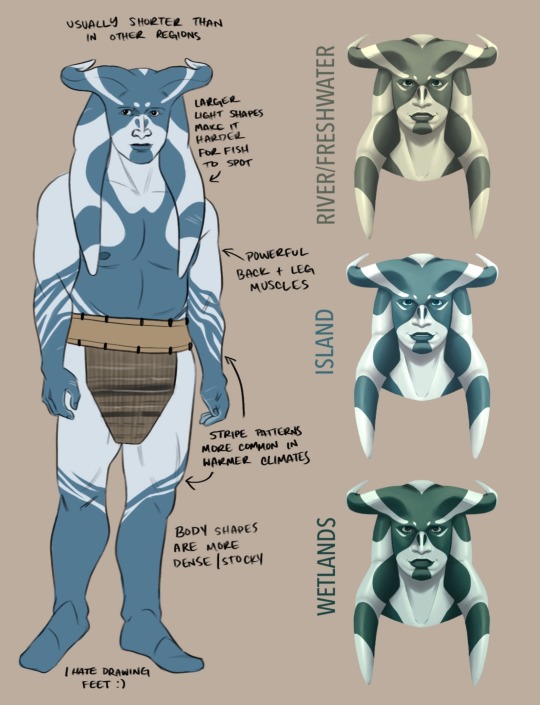
PART 1 of my project on mapping out regional variations in the people of Shili, also known as the togruta!
For even more detail, read below!
Shili is home to a variety of coastal communities, ranging from freshwater, to wetlands, to oceans, to small islands whose populations have remained more genetically isolated. Many of the traits seen in individuals of these regions were developed to help them become the best fishermen and swimmers of the planet.
Their most defining features are the larger, smooth markings across their bodies that can be broken down into thin stripes, much like some of the aquatic life they hunt. Combined with their often more horizontal montrals and shorter lekku, it is hard to mistake someone who hails from these communities.
The one shown in this example is wearing a traditional loin piece that has been worn by his people for generations and is based on the Maro and similar Polynesian styles.
Often host to people from all over their planet or other planets in nearby systems, the ocean regions have begun to develop a bit of a tourism industry. Of course, many of the communities who have lived and fished those waters for centuries are now pushing back on the change in local culture. Many of the oldest villages on Shili are found on these coasts and still hold their traditions very close to their hearts.
This design mainly based off of small physiological adaptations that different groups would develop over periods of time in certain climates and ecosystems. Many modern togruta may have a combination of traits from different regions in their appearance and this is related to the gradual globalization of the planet and its cultures.
Hope you enjoyed and keep an eye out for more variations!!
#star wars#digital art#character concept#concept art#togruta#Shili#Ahsoka tano#shaak ti#Star Wars lore#original characters#Star Wars oc#character design#reference sheet#character guide#Star Wars fan#star wars fan art#world building#illustration#procreate#artists of tumblr#fan art#the clone wars#prequel trilogy#original trilogy#sequel trilogy#Star Wars art#Star Wars artist#world building guide#procreate art#digital painting
103 notes
·
View notes
Text
Character Notes: A Guide
Character's Full Name
Type of Character (Main, Side, etc)
Nicknames
Age
Gender/Sex
Occupation
Characterization
Personality Type
Flaw
External Motivation
Internal Motivation
Positive Traits
Negative Traits
Quirks and Mannerisms
Fears and Phobias
Life philosophy or motto
Most treasured possession
Other notes
Voice
Favorite Vocabulary
Speech patterns, habits, quirks
Educational Level
Race, culture, religious influences
Slang
Direct and to the point or oblique and rambling
Assertive or passive
Proactive taking charge or reactive and following
Sense of humor
Metaphor preferences
Other notes
Backstory Overview
Birth
Childhood
Adolescence
Early Adulthood
Middle Age
Mature Years
Elderly Years
Death
Personality
Are they optimistic or pessimistic?
Are they introverted or extroverted?
What words of phrases do they overuse?
Do they ever put on airs?
How intelligent are they?
What bad habits do they have?
What makes them laugh out loud?
Are they neurotypical or neurodivergent?
How do they want to be seen by others?
How do they see themselves?
How are they seen by others?
How competitive are they?
Do they make snap judgments or take time to consider?
How do they react to praise?
How do they react to criticism?
What is their greatest fear?
What are their biggest secrets?
What is their philosophy of life?
When was the last time they cried?
What haunts them?
What are their political views?
What will they stand up for?
Who do they quote?
Do they have a catchphrase?
Are they indoorsy or outdoorsy?
What is their sinful little habit?
What sense do they most rely on?
How do they treat people better than them?
How do they treat people worse than them?
What quality do they most value in a friend?
What do they consider an overrated virtue?
If they could change one thing about themselves, what would it be?
What is their obsession?
What are their pet peeves?
What are their idiosyncrasies?
Physical Appearance
Height
Weight
Build
Hair color
Hair Style
Eye Color
Eye Shape
Do they wear glasses or contact lenses?
What distinguishing facial features do they have?
Describe their skin
Which bodily feature is most prominent?
Which facial feature is most prominent?
Do they have any other distinguishing physical features?
Describe their hands
Do they wear make up?
Do they have any physical disabilities?
Do they have any scars?
Do they have any birthmarks?
Do they have any tattoos?
What sort of clothes do they wear?
How do they wear their clothes?
Describe their feet / shoes
Do they have any distinguishing physical mannerisms?
Are they in good or poor health?
Friends and Family
Is their family big or small? Who does it consist of?
What is their perception of family?
Do they have siblings? Older or younger?
Describe their best friend
Describe their ideal best friend
Do people build lasting friendships?
Describe their other friends
Describe their acquaintances
Who are their natural allies?
Who are their surprising allies?
Do they have any pets?
Past and Future
What is their date of birth?
Where were the born?
Where did they grow up?
Did they grow up rich or poor?
Did they grow up nurtured or neglected?
What is the most offensive thing they've ever said?
What is their greatest achievement?
What was the worst thing they did to someone they loved?
What are their ambitions?
What advice would they give to their younger self?
What smells remind them of their childhood?
What was their childhood ambition?
What is their best childhood memory?
What is their worst childhood memory?
When did / will they die?
Did they have an imaginary childhood friend?
Where did / will they die?
When was the last time they were crushed with disappointment?
What past act are they most proud of?
What past act are they most ashamed of?
Has anyone ever saved their life?
What is their strongest childhood memory?
Love and Relationships
Are they in a relationship?
How do they behave in a relationship?
Are they looking for a long term relationship?
How many relationships have they been in?
Have they ever been in love?
Do they believe in love at first sight?
How do they display affection?
What was their first kiss like?
Have they ever had their heart broken?
What do they look for in a partner?
What attracts them to someone?
When did they last have sex?
What sort of sex do they have?
Have they ever had a one night stand?
What's their view on marriage?
Conflict
How do they respond to a threat?
Are they more likely to fight with their fists or their tongue?
What is your character's kryptonite?
How do they perceive strangers?
What do they love to hate?
What are their phobias?
What is their choice of weapon?
What living persons do they most despise?
Have they ever been bullied or teased?
Where do they go when they're angry?
Who are their enemies, and why?
Work, Education and Hobbies
What is their current job?
What do they think about their current job?
What are some of their past jobs?
What are their hobbies?
What is their educational background?
What is their intelligence level?
Do they have any specialist training?
Do they have a natural talent for something?
Do they play sport? Are they any good?
What is their socioeconomic status?
Favorites
What is their favorite sport?
What is their favorite food?
What sport do they hate?
What is their favorite animal?
What food do they hate?
Which animal do they dislike the most?
What place would they most like to visit?
What place do they hate?
What is the most beautiful thing they've ever seen?
What's the ugliest thing they've ever seen?
What is their favorite song?
What is their favorite book?
What kind of music do they listen to?
What kind of music do they hate?
What kind of art do they like?
What kind of art do they hate?
Who is their favorite artist?
What's their favorite work of art?
What do they like to read?
What do they hate to read?
What is their favorite color?
What is their password?
What is their favorite day of the week?
What is their favorite season?
What is their favorite time of day?
Possessions
What is in their fridge?
What's in their bag?
What is on their bedside table?
What is in their car?
What is in their bin?
If your character could save only one thing from their burning house, what would it be?
What is in their purse or wallet?
What is in their pockets?
What do they bring everywhere with them?
What is their most treasured possession?
What was the nicest gift they ever received?
Spirituality
What are their religious views?
Who or what is their guardian angel?
Do they believe in the afterlife?
What do they think heaven is?
What do they think hell is?
Are they superstitious?
What would they like to be reincarnated as?
How would they like to die?
What is their family/animal guide?
What is their zodiac sign?
Values
Where do they get their values?
What are their most important values?
What do they think is the worst thing that can be done to a person?
What is their view of 'freedom'?
When did they last lie?
What's their view of lying?
When did they last make a promise? Did they keep it?
When did they last break a promise?
Daily Life
What time to they get up in the morning?
What time to they go to bed?
What are their eating habits?
Do they have any allergies?
What is their home like?
Are they minimalist or a clutter hoarder?
What do they do first thing in the morning?
What do they do on a Sunday afternoon?
What do they do on a Friday night?
What is their soft drink of choice?
What is their alcoholic drink of choice?
Miscellaneous
What is their title?
What's the meaning of their name?
Who is their hero?
What would they dress up as for Halloween?
Are they comfortable with technology?
What is their middle name?
If they could save one person, who would it be?
If they had to call someone for help, who would it be?
What is their favorite proverb?
What is their greatest extravagance?
What is their greatest regret?
What is their perception of redemption?
What would they do if they won the lottery?
What is their favorite fairy tale?
What fairy tale(s) do they hate?
Do they believe in happy endings?
What is their idea of perfect happiness?
What would they ask a fortune teller?
If they could travel through time, where would they go?
If they could have a superpower, what would they choose?
What do they excel at?
What can they never learn, no matter how hard they try?
Have they ever been in jail?
#writing#character prompt#writing guide#character guide#okay to reblog#writing help#writing stuff#character development#character sheet#character backstory#writeblr#creative writing#original character#oc notes#oc
104 notes
·
View notes
Text
Red Peafowl The Series: Frank, Maiake and Long Shi
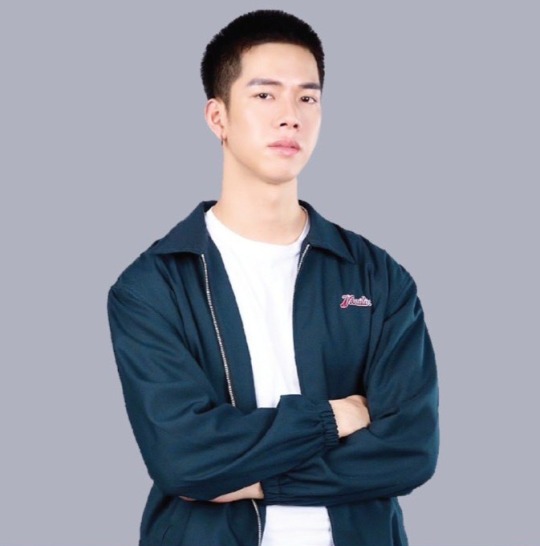

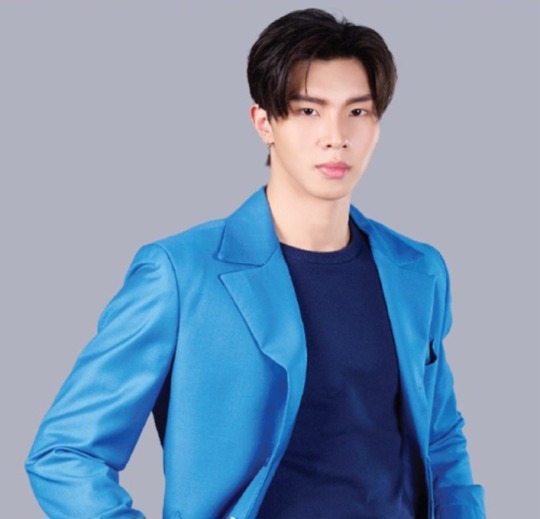
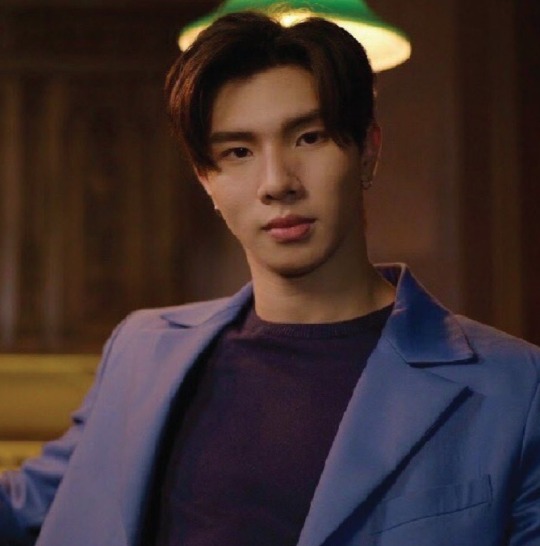


Yu Mou Yi (Frank Thanatsaran) secretly delivers news to Lu Yi Peng (ML Maiake Kandis Wanaroon). Most frequently about Hong Kong Que (ML Dollar Patchara), and Tong Bai Shi (Lee Long Shi). The latter is a part of a big mafia group Green Dragon/Qing Long, involved in human and organ trafficking.
04.11.23
#here's your almost daily and still confusing update#red peafowl the series#character guide#cast#blmpff
29 notes
·
View notes
Text
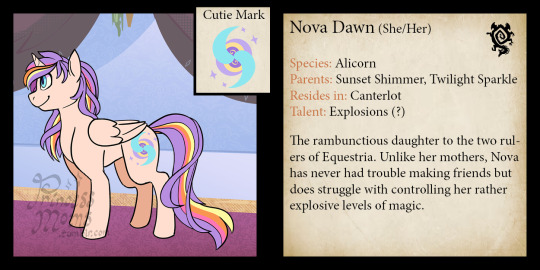

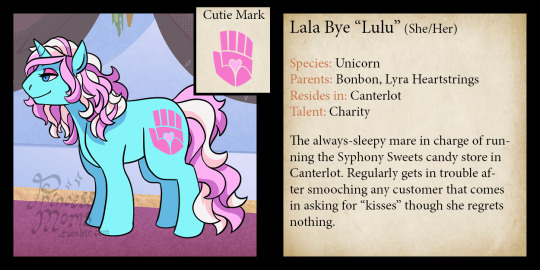


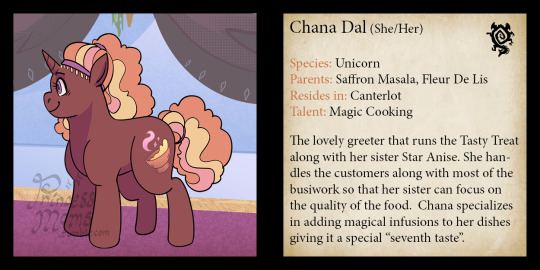

Character Guides (Pt. 1) - Canterlot
Made a bunch of these quick references for my nextgen ocs. Will be posting the rest this week.
Since these turned out so fast to make, I will also make pages for the older version of the mane six, the student six, and any other characters that you can send letters to.
#character guide#nova dawn#dusk eclipse#lala bye#glam rock#mashup#chana dal#star anise#mlp next gen#mlp ask blog#my little pony
65 notes
·
View notes
Text
A Thousand Autumns / Qian Qiu Spoiler-Free Character Guide
** This is being updated as I read, please DO NOT reply or reblog with spoilers- including in tags.
Main Characters
Yan Wushi - Master of the demonic Huanyue Sect, who has been in seclusion for 10 years after losing in battle to the Grandmaster of Demonic Cultivation Wei Wuxian Cui Youwang.
Shen Qiao - Qi Fengge's disciple, now leader of the Xuandu Mountain Sect. Yeeted off a cliff at the start of the novel, he is left crippled and barely alive.
Huanyue Sect
Yu Shengyan - Yan Wushi's disciple and fellow member of a demonic sect. He was Yan Wushi's disciple for only three years before the ten year seclusion began, and immediately begins following his master upon his emergence.
Bian Yanmei - Yan Wushi's eldest disciple.
Göktürks
Hulugu - A Göktürk warlord who lost a battle to Qi Fengge and was forced to retreat from the Central Plains for 20 years.
Kunye - Disciple of Hulugu, Wise King of the Left, and the most talented warrior of the Göktürks.
Imperials
Gao Wei - The emperor of Qi. A lazy, over-indulgent man who has destroyed the strength of the empire.
Yuwen Yong - Emperor of Zhou.
Hehuan Sect
Yuan Xiuxiu - Current sect leader of Hehuan Sect.
Sang Jingxing - An underling to Yuan Xiuxiu, former disciple to Cui Youwang.
Cui Youwang - A Grandmaster of Demonic Cultivation who is definitely not Wei Wuxian. Believed to be dead.
Yan Zhiwen - Grand Master of Remonstrance in the Qi Empire, a spy for Hehuan sect.
Yecheng
Other Characters (I'll add categories as I figure them out)
Qi Fengge - A righteous and mighty Daoist of the Xuandu Mountain sect. He forced his greatest enemy to sign a 20 year truce rather than kill him, which is nearly expired. Qi Fengge is believed to have died 5 years ago.
Yi Pichen - A member of Chunyang Monastery, one of the top three warriors in the world. Representing Daoism.
Xueting of Zhou - A buddhist master and one of the top three warriors in the world. Representing Buddhism.
Ruyan Kehui - A member of Linchuan Academy sect, one of the top three warriors in the world. Representing Confucianism.
Kosa Sage - A member of the Tuyuhun people (or is that a sect) who is also one of the top warriors in the world.
15 notes
·
View notes
Text
After School Lessons for Unripe Apples - character guide version 2
Here is the updated version of the Character Guide, pictures, text and spelling updated. This version uses the English name order and the spelling used in the English version of special episode (#66) with the character’s profiles.
I also kept a version with the Korean name order and spelling but updated character info, if there is interest, I’ll share that one as well.

Spelling within the webtoon occasionally changes for some characters.
#after school lessons for unripe apples#aslfua#afterschool lessons for unripe apples#alfua#soonkki#character guide#webtoon#hwang miae#miae hwang#kim chul#cheol kim
90 notes
·
View notes
Text
Hellknight (Pathfinder Second Edition Archetype)
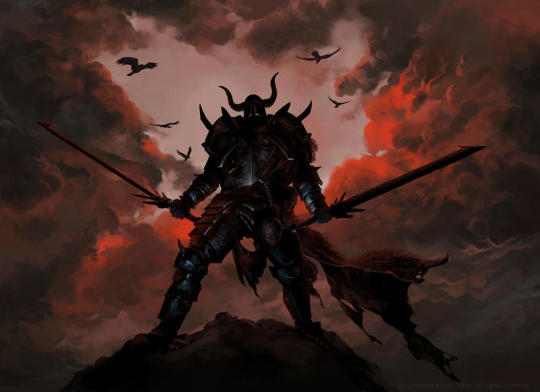
(art by priapos78 on DeviantArt)
Ah yes, the hellknights. We’ve talked about them a few times on the blog before, these intimidating mercenaries that believe that Hell is a model of a perfect civilization, and that elements of it can be used by mortals to make a better, more orderly society.
The exact specifics of this varies by individual orders, but the general gist of it is that these warriors honestly believe they can emulate the forces of tyranny while somehow being above them. Their hubris aside, they can be a powerful force against monsters and bringers of chaos, but never to be trusted, not even the lesser orders with more niche and less tyrannical designs.
In any case, today we’re covering the hellknight archetype, which, much like the halcyon speaker two weeks ago, is an archetype that evolves out of another archetype, specifically the hellknight armiger, which represents those still undergoing basic training as hellknights before properly joining their ranks.
These proper hellknights are the martial arm of the orders, unlike their magical counterparts, the signifers. Though some might still use magic if they have the training.
Much like other “graduated” archetypes, the hellknight only grants a few abilities, the rewards for sticking with their training as armigers.
These abilities prove quite powerful, however, turning the warrior into an agent against chaos.
The dedication of being a Hellknight requires that the character already be an armiger, bypassing the normal need for armiger feats before taking another archetype. With it, they learn to be more intimidating and make the most of their shiny new hellknight plate.
Some among them seem to develop a sixth sense for chaos, able to hunt it down no matter where it hides.
Invoking divine power in their belief in the rule and power of law, some are able to strike down chaotic foes, dealing grievous wounds to such beings.
Many others develop further mastery in not just their armor, but also any signature weapons of their order.
And that’s it for this archetype. Fret not though, since it is meant to be paired with the hellknight armiger, the meat of your Hellknight-themed abilities will be found there, which we’ll fairly soon on the blog as well, so stay tuned for that. As it stands, this archetype is a nice little capstone which can offer martial classes improved use of their weapons and armor, as well as extra damage utility and changing damage type. Beyond that, your class and choices as an armiger will help inform your build.
I didn’t mention it before, but there is also a story prerequisite for this archetype. In order to become a Hellknight, one must pass one final test, facing a bearded devil in single combat and defeating it. Such a feat may not seem like much to a hardened adventurer, but it certainly is a daunting test to face alone, especially at the level that you’d expect to be ready to graduate. Needless to say, it’s a feat that no lesser warrior can hope to accomplish, and if you fail… well, you clearly were not cut out to be a Hellknight. Such is the harsh nature of their training and their expectations.
They say that Mt. Sunreva once plugged the great cosmic pit where devils call home. While this is surely an exaggerated folk tale, the fact that there is a thin spot leading to that hellish plane at the summit is very, very true. Dark forces consider the mountain sacred in their own way, and an order of armored warriors guards the base from the unworthy.
Though she has utterly no interest in them, the Hellknight Order of the Waves have taken the ancient brine dragon Koshaga as their symbol, seeking to emulate her control over her territory in their own seafaring patrols. They had best be careful, however, for eventually she will likely look upon them as interlopers as well, and no flattery will stop her once her ire is roused.
For years, he has been training, and now Sovis, a half-elven armiger, has finally become a Hellknight. His first mission, however, has him bringing his sword to bear on his elvish kin, freedom fighters from the forest of his birth opposing the new lord’s logging and taxation. Sovis stands on the edge of a knife, and the time will come soon when his conflicting loyalties will be tested.
13 notes
·
View notes
Note
I've seen some comments (haters) saying that Levi felt betrayed by Erwin when he found out about his dream but I feel like they use it as if it means some kind of proof against Eruri and I don't understand them. Have you written anything about it?
Uhh…I honestly can’t remember if I’ve answered anything about this specific point or not. I’m pretty sure I’ve touched on it response to other asks but I’m struggling to dig anything out of the archive.
This information comes from the Character Encyclopedia or Character Guide and I’ve copied the relevant pages below so you can read the official translation of what Isayama said. (Apologies for the shitty caps.) There’s no question that Levi does feel shocked and “almost betrayed” when he discovers that far from being the lofty, selfless individual who has devoted himself unfaiilingly to the altruistic goal of saving humanity, Erwin is as human and fallible as the rest of humanity. The whole point of this revelation is that despite discovering that Erwin is just a man, with all the frailties and fallibilities of other men, Levi still chooses to follow him. It’s the realisation that Erwin struggles with the burden of following his duty and his dream that leads Levi to make the choice on his behalf and, ultimately, to let him rest in peace.

There’s a lovely quote about Erwin’s humanity that comes from Ono Daisuke and Kamiya Hiroshi’s Dear Girl: Stories radio series where they discussed Midnight Sun.
O: “However, in coming back to being a human, it was when he talked to Levi, probably” (K: *assents*) “Well, all this time, probably, Levi was the last fortress, I think, that he can be as human.”
@tsuki-no-ura has translated this interview here if you want to read it.
So, far from disproving the importance of Erwin and Levi’s relationship, I think the fact that Levi continues to follow Erwin to the bitter end and beyond, even after realising that he was just a man chasing an innocent childlike dream, only highlights the depth of his devotion.
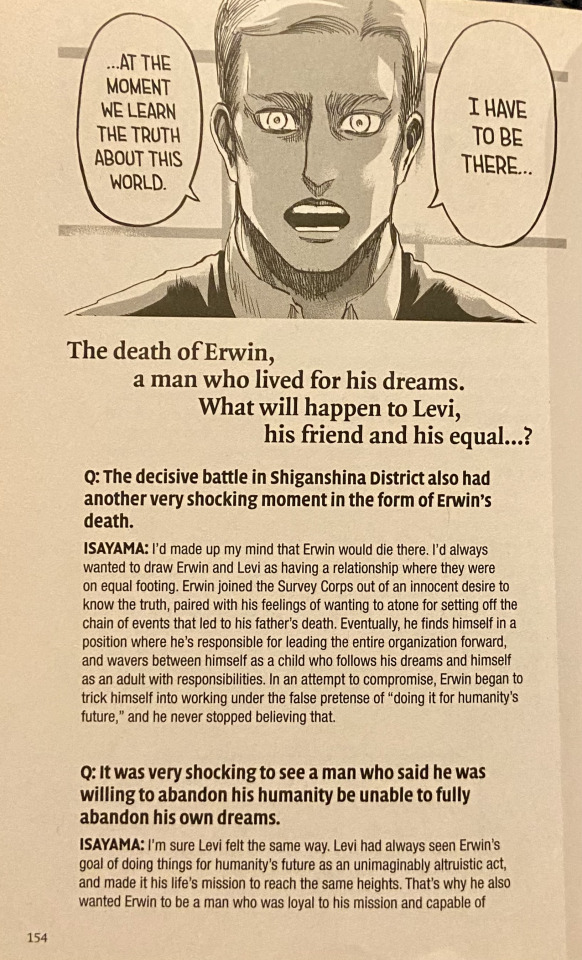
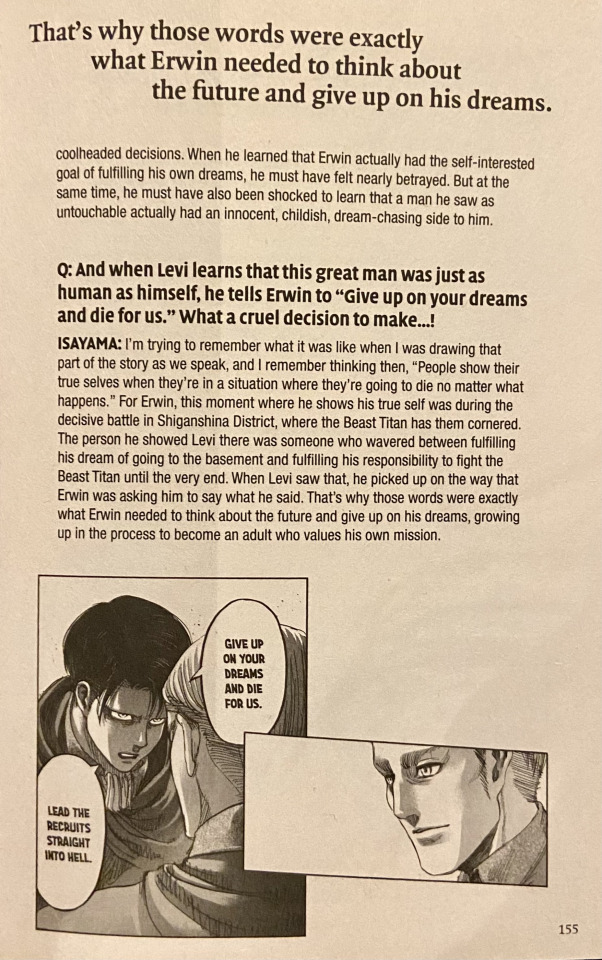
51 notes
·
View notes
Note
Kuro doesn't have like a fanbook with information of the characters?
There is an old Character Guide, but it generally doesn't mention birthdays. Parts of the guide are done like interviews with celebrities. Unlike the usual celebrity interviews you'd see in places like Japan, though, the Character Guide doesn't mention blood types, either, and that's interesting, considering what's going on right now.
There might be some unofficial guides, but they would be just that -- unofficial. Any birthdays or other information they give that isn't shown in the manga would be speculative at best.
20 notes
·
View notes